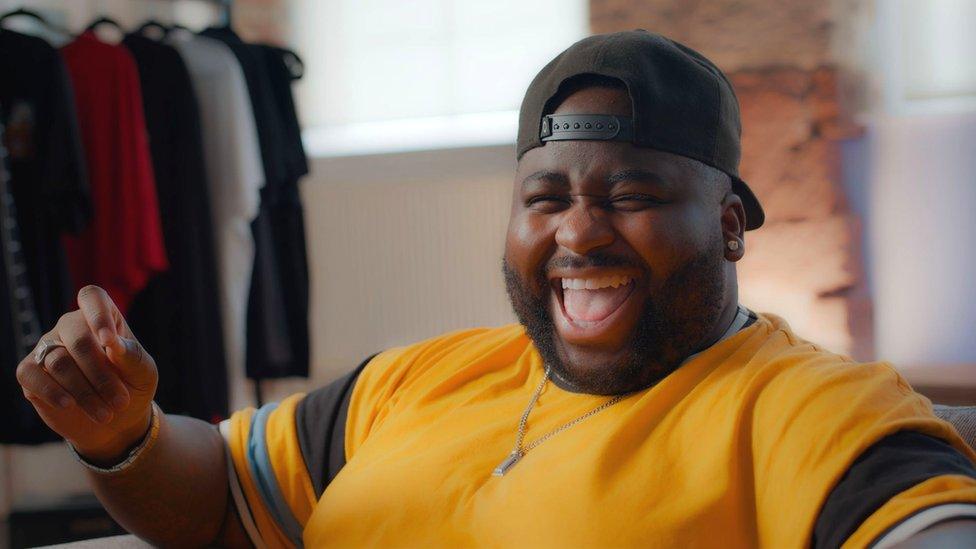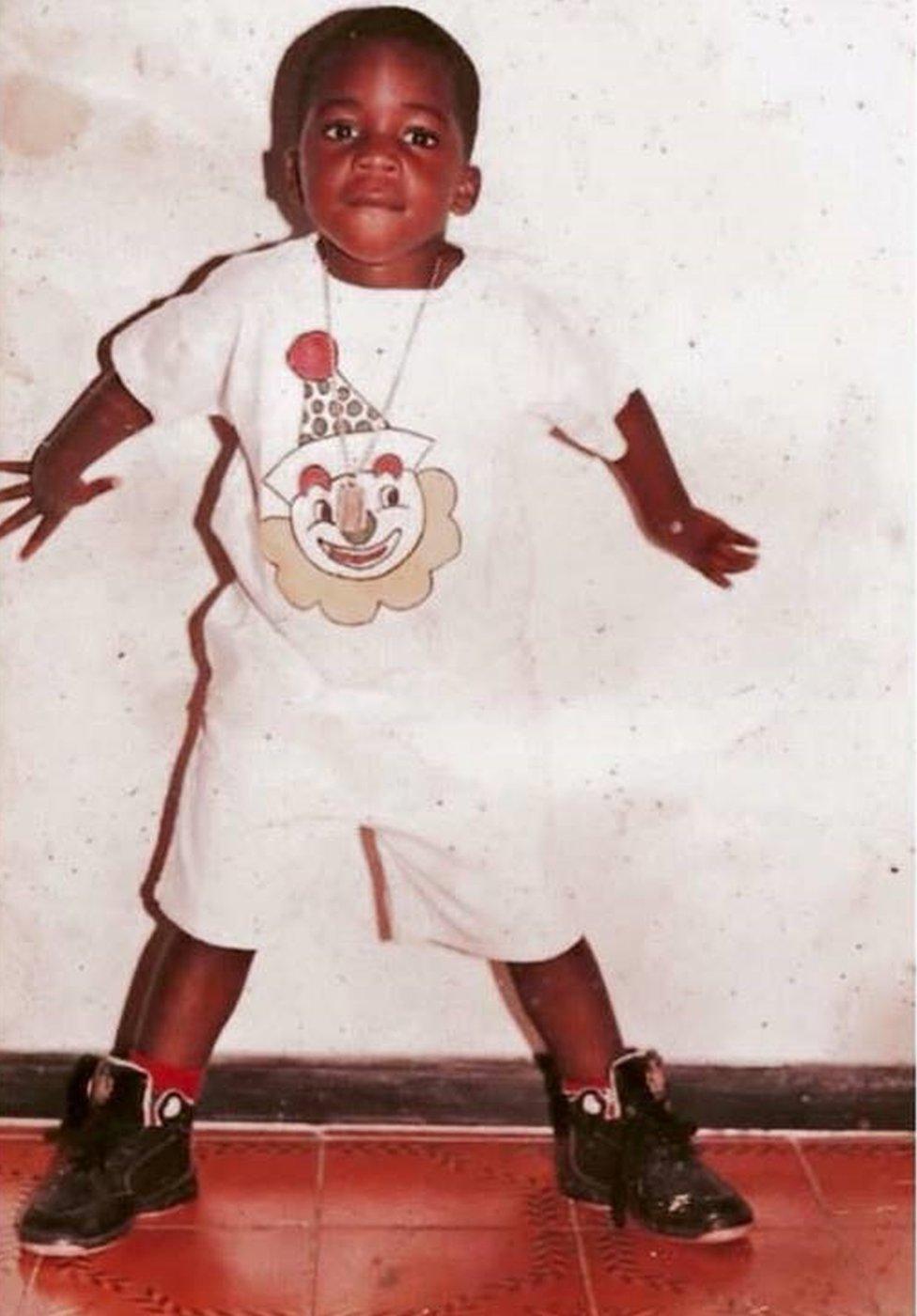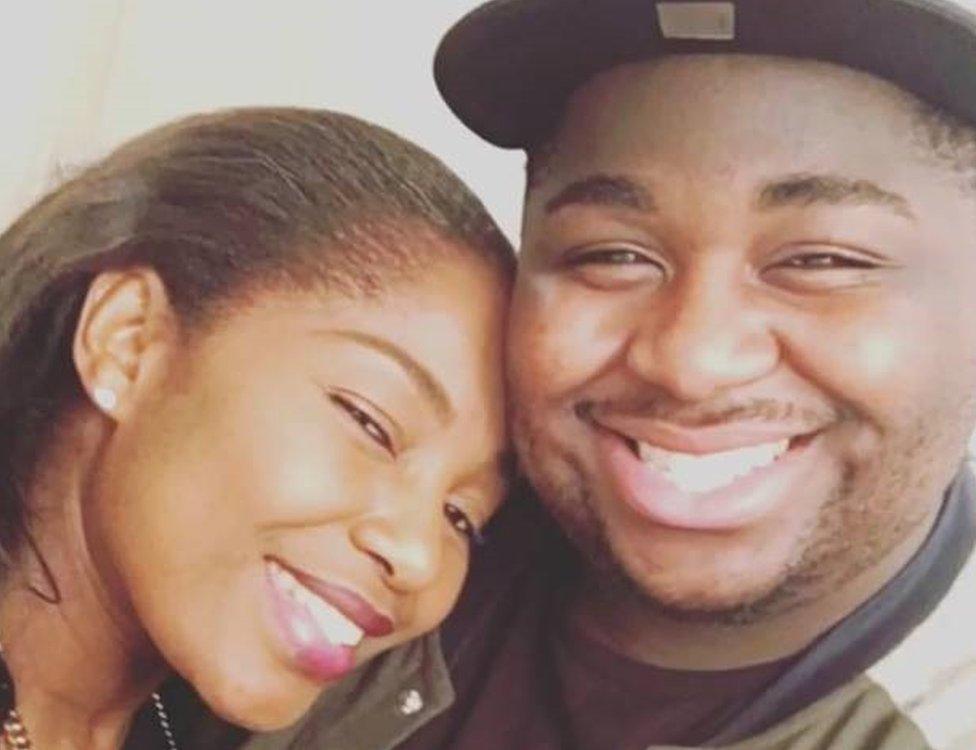Bash the entertainer: 'To fight racism I used comedy'
- Published

Bash the Entertainer arrived as an asylum seeker in the UK from the Democratic Republic of Congo
Bash the Entertainer's infectious laugh and crazy videos have made him hugely popular but he says he decided to become the "funny guy" after getting racist abuse in school.
Now 27, Bash has millions of followers across social media platforms, especially TikTok, but still remembers his first day at school in Glasgow.
Seven-year-old Bachala Mbunzama had arrived in the UK as an asylum seeker from the Democratic Republic of Congo.
"We lived in a hotel in London for about a year," he says. "Until one day our names were on a list telling us we would be sent to Glasgow."
"I would not say we picked Glasgow. We just got given it."

Bash came to Scotland after the family "were given Glasgow"

Soon after arriving in the city, he started school.
Bash tells the BBC Scotland documentary Behind the Smile that he wanted to make friends and went over to a group to say hello.
A girl stepped out of the crowd and spat in his face, he says.
"All I did was wipe it off. I thought 'is this how you get treated in Scotland?'," Bash says.
"In London I never experienced that. My first racist encounter was that day."
It wasn't the last, he says.
Every time he was racially insulted it brought his confidence "from 100 to zero", Bash says, but he could not work out how to fight back.
He says he would often try to keep away from people by pretending he did not speak English.
Later at high school, he noticed that if he joked it made him popular.
"When I started hearing people say 'he's funny' I started feeling more comfortable," he says.
"People like funny people. That's my armour. If someone was about to fight me or swear at me they would say 'I can't fight this guy, he's funny'. To fight racism I used comedy."
And the racist stereotypes and abuse he suffered was used in his comedy.
Bash has posted videos about how he was asked if, when he lived in Africa, he had to chase his dinner with a spear or how all people in Glasgow wanted to feel his hair.
"I would take that race thing that hurt me the most and I would turn it into a wee sketch," he says. "That's how I dealt with it."

Bash the Entertainer with his mother Antoinette
At first he posted on Vine, a briefly popular site that shared six-second videos, but he started to get more successful when he went on Facebook.
"The people I did not expect to find it funny, did," he says.
"The people that were in school that were mean or bullying me when I was there, they laughed. The people I used to want approval from were laughing."
He was now at college studying construction and had worked in nightclubs but posting videos became his main obsession.
His big break came about four years ago when he shared a video showing his response to Rihanna wearing shoes that looked like a pencil.
Bash posted a simple video featuring his booming laugh and it got noticed and shared - around the world.
It got re-posted in so many places it notched up seven million views in a day.
Bash the Entertainer was a hit but his mum was not so sure about her boy's chosen career.
He says she came around when she saw how much he was getting paid for a link-up with social media site Unilad.
Since then he has built up a huge following over YouTube, Twitter, Facebook, Snapchat and TikTok,
He recently posted a video on Tiktok that got 30 million views.
It was a short clip of him blowing his lips to the sound of gunshots.
Other hits include the CEO of Copying Sounds and his takedowns of the outfits worn by celebrities for the annual Met Gala.
The consistent success of his videos has brought financial rewards in the form of advertising revenue and brand tie-ups with fast food and clothing companies.
But there is a dark side in the comments left on social media.
"Online hate gets right in here," he says pointing at his brain. "And it stays there."
"It'll get to the point where I don't want to post because I don't want people to say mean things about me," he says.
Behind the constant smile and his trademark laugh is pain and memories of his past, Bash says.
He is enjoying his success but he is also battling panic attacks and stress.
He says he tries every day to be positive and true to himself.
"The way I was raised was always to be humble," he says. "I don't like to be too flashy, I'm always happy with what I've got."
So despite his success he is not living the high life in a penthouse apartment or 10-bedroomed mansion, although he says he could be.
He still lives in a Glasgow high rise but jokes: "Maybe soon you'll see me in a Merc and a big mansion."